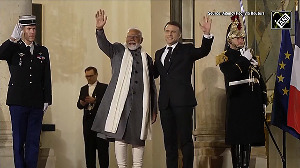Based on the precept that genies cannot be thrust back into their bottles, the technology now available to help review umpiring decisions cannot now be denied to the officials themselves.
Theoretically, the International Cricket Council (ICC) can still scrap the Umpire Decision Review System (UDRS) under which either side can refer an on-field umpire's decision to a third official who has access to television replays and ball-tracking technologies.
The case for returning to purely on-field decisions was robustly put by England and Wales Cricket Board (ECB) chairman Giles Clarke during the fourth Test between South Africa and England this month.
"We are better off with the old system," Clarke said. "If the umpire is as deaf as a post and as blind as a bat at least it's the same for both sides."
In practice, excluding match officials from replays of controversial decisions freely available to the casual television viewer is unlikely to be endorsed by the ICC's cricket committee in Dubai in May.
"If it becomes just too hard and too costly maybe we just have to accept that situation and deal with human umpires," ICC general manager Dave Richardson said in a telephone interview.
"But at this point in time the general consensus seems to be: 'It works, it gets more decisions right, it is resulting in more correct decisions and therefore work on improving it, refining it and standardising it'."
SIGNIFICANT IMPROVEMENT
Richardson said the UDRS had been used during 13 tests in South Africa, Australia and New Zealand.
"The bottom line is that in all the series we have used it, 13 test matches overall, if we hadn't use DRS we would have talked about umpires getting about 91 percent of their decisions right," he said.
"But we have been able to correct the number of those mistakes so the overall number now is 97 percent. So that to us is a significant improvement."
Clarke's comments were sparked by England's anger at decisions made by third umpire Daryl Harper.
However, they overlooked the role played by the third official in the Cape Town test, where three clearly erroneous on-field decisions, two of them by Harper, were over-ruled.
The impetus for a referral system comes from technology which has enabled television commentators, television viewers, reporters and, on occasions, spectators at the ground to see slow-motion replays of decisions made by an umpire who has to adjudicate on the basis of what he has just seen with the naked eye.
"We have slightly got into the mentality as viewers of television broadcasts as regarding the scrutiny of the umpires' decisions as part of the entertainment," Richardson said.
"So if we are going to do that it is only fair that they then get the opportunity to use the technology to get their decision right in the end."
STANDARDISED TECHNOLOGY
One problem in the South Africa-England series was the absence of either HotSpot or Snickometer technology, which helps to detect whether a batsman has edged the ball, because the host broadcasters could not afford it.
If the ICC member countries want umpires in all series to have access to the latest technology, the solution seems simple: they can agree among themselves that they will put up the money.
"The general feeling is we definitely need to work to refine the specifications as the technology gets better and better," Richardson said.
"And I think there is a general consensus that we need to standardise the technology from series to series so it becomes a bit easier for the captains to learn the circumstances in which they should be asking for a review and when not to.
"You can understand it if you come from a series in which HotSpot was used and you've got one in which it's not used and you suddenly ask for a review and it's overturned. You can understand the frustration.
"But we have to accept that in some countries the revenues generated from television rights and test cricket are not that high. So to spend additional money on technology is a sort of burning question.
"The theory goes for those countries, if you can improve the decision-making by three percent isn't that better than not having anything at all?
"It's like the argument about the bullet-proof vest: is it better to have a bullet-proof vest and stop a couple of bullets but the stray one gets through or do you need to have the bullet-proof car which stops all bullets?"








 © 2025
© 2025